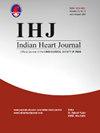Psychological problems and burnout among healthcare workers: Impact of non-pharmacological lifestyle interventions
IF 1.4
Q3 CARDIAC & CARDIOVASCULAR SYSTEMS
引用次数: 0
Abstract
Objective
To evaluate role of rajyoga meditation (RYM) versus stress management counselling (SMC) in addressing burnout syndrome and resultant improvement in electrocardiogram (ECG) so as to automate burnout prediction from raw ECG data with machine learning (ML).
Methods
Healthcare providers were assigned to two groups: RYM (n = 100) or SMC (n = 102). Subjects in RYM received rajyoga for 3 months including one week offline and thereafter, virtual mode. SMC group received counselling for 1 day in offline mode and thereafter, received positive thoughts on a weekly basis. All subjects were assessed for psychological (depression, anxiety, stress scale-21 (DASS-21) and burnout syndrome (Mini Z questionnaire) along with 12-lead ECG at baseline after 4 weeks, and after 12 weeks. Based on response on question 3 of the Mini-Z questionnaire, participants were classified either as burnout or satisfied.
Results
RYM group showed significant reduction in depression, anxiety, and stress in comparison to SMC group. Burnout results display significant reduction in the RYM group in comparison to SMC group. Reduction in burnout and enhancement in satisfaction from visit-1 to visit-3: burnout visit-1 (27.2 %), visit-2 (23.8 %), visit-3 (19.3 %) and, satisfaction visit-1 (72.8 %), visit-2 (76.2 %), and visit-3 (80.7 %). ML algorithms could identify burnout patients using the raw ECG data with time-series features based classifier performing better than Ultra Short HRV features based ML classifier model.
Conclusion
AI based early diagnosis of heart's healthy status using ECG analysis may prevent development of cardiovascular disorder in the long run.
医护人员的心理问题和职业倦怠:非药物生活方式干预的影响。
目的评估瑜伽冥想(RYM)与压力管理咨询(SMC)在解决职业倦怠综合征和改善心电图(ECG)方面的作用,以便利用机器学习(ML)从原始心电图数据自动预测职业倦怠:RYM组(100人)或SMC组(102人)。RYM组的受试者接受为期3个月的Rajyoga训练,其中包括一周的离线训练,之后接受虚拟模式训练。SMC 组接受为期 1 天的离线模式辅导,此后每周接受正念辅导。所有受试者在 4 周后和 12 周后接受心理评估(抑郁、焦虑、压力量表-21(DASS-21)和倦怠综合征(Mini Z 问卷))以及 12 导联心电图。根据对迷你 Z 问卷第 3 个问题的回答,参与者被归类为职业倦怠或满意:结果:与 SMC 组相比,RYM 组的抑郁、焦虑和压力明显减少。职业倦怠结果显示,与 SMC 组相比,RYM 组的职业倦怠明显减少。从就诊 1 到就诊 3,倦怠感减少,满意度提高:倦怠感就诊 1(27.2%)、就诊 2(23.8%)、就诊 3(19.3%),满意度就诊 1(72.8%)、就诊 2(76.2%)、就诊 3(80.7%)。基于时间序列特征的分类器比基于超短心率变异特征的ML分类器模型表现更好:结论:基于人工智能的心电图分析对心脏健康状况的早期诊断可从长远角度预防心血管疾病的发生。
本文章由计算机程序翻译,如有差异,请以英文原文为准。
求助全文
约1分钟内获得全文
求助全文
来源期刊

Indian heart journal
CARDIAC & CARDIOVASCULAR SYSTEMS-
CiteScore
2.60
自引率
6.70%
发文量
82
审稿时长
52 days
期刊介绍:
Indian Heart Journal (IHJ) is the official peer-reviewed open access journal of Cardiological Society of India and accepts articles for publication from across the globe. The journal aims to promote high quality research and serve as a platform for dissemination of scientific information in cardiology with particular focus on South Asia. The journal aims to publish cutting edge research in the field of clinical as well as non-clinical cardiology - including cardiovascular medicine and surgery. Some of the topics covered are Heart Failure, Coronary Artery Disease, Hypertension, Interventional Cardiology, Cardiac Surgery, Valvular Heart Disease, Pulmonary Hypertension and Infective Endocarditis. IHJ open access invites original research articles, research briefs, perspective, case reports, case vignette, cardiovascular images, cardiovascular graphics, research letters, correspondence, reader forum, and interesting photographs, for publication. IHJ open access also publishes theme-based special issues and abstracts of papers presented at the annual conference of the Cardiological Society of India.
 求助内容:
求助内容: 应助结果提醒方式:
应助结果提醒方式:


